Stories > Solidarity in Pandemic
Solidarity in Pandemic
With global implications, the evolving Covid-19 situation has inspired locals and foreigners in Singapore to band together to help communities within and beyond the country.
BY CHARLIE SHAPIRO
PHOTOS THE STRAITS TIMES/SPH; ROSLINA TOH; GAURAV KEERTHI; MISSNIO/INSTAGRAM
he evolving Covid-19 outbreak has brought Singapore’s spirit of volunteerism and collaboration for the collective good to the fore.
While authorities have rushed to contain the spread of the deadly coronavirus, which has infected 4.4million* people locally and globally so far, individuals and groups are working together assiduously to address the health emergency. Such efforts can be described by the term gotong royong, translated from Bahasa Indonesia to mean cooperation in the community.
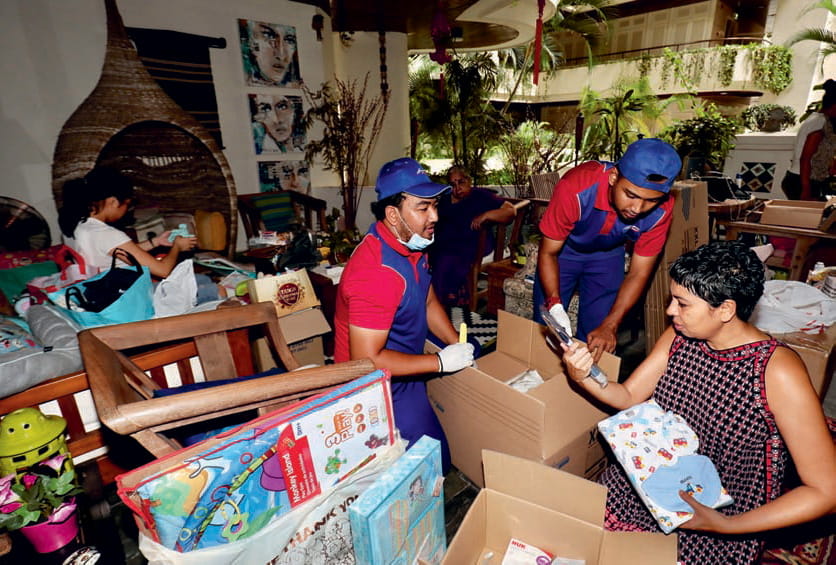
It’s Raining Raincoats founder Dipa Swaminathan and her team of volunteers distribute personal hygiene items to thousands of foreign workers.
From Singaporeans showing their support for frontline healthcare workers to locals and foreigners teaming up to gather essential items such as face masks and hand sanitisers for vulnerable communities, initiatives mushrooming across the Little Red Dot reflect how a homespun philosophy has manifested in acts of altruism.
A COMMUNITY THAT CARES
One such organisation is Its Raining Raincoats (IRR), which aims to provide migrant workers with rain protection gear while building bridges between them and the larger society through outreach initiatives. To help curb the spread of the virus among the community – who often live in close quarters with one another in dormitories – the non-profit organisation posted an appeal on Facebook calling for the donation of face masks, hand sanitisers and soaps for migrant workers.
“From Singaporeans Showing Their Support For Frontline Workers To Locals And Foreigners Teaming Up To Gather Essential Items For Vulnerable Communities, Acts Of Altruism Have Mushroomed Across The Little Red Dot.”
With transmission of the virus having already taken place among foreign construction workers, IRR founder and corporate lawyer Dipa Swaminathan expressed that workers were growing increasingly concerned. “We’ve been assuring the workers to stay calm and practice good hygiene. Our volunteers, which include Singaporeans and expats, are doing a great job of distributing the hygiene items as well as sharing with them essential information such as seeing a doctor immediately if they are feeling unwell.”
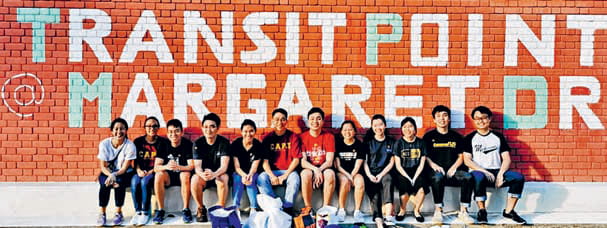
Roslina Toh and other volunteers with Home Away From Home project have helped find temporary shelter for Malaysian workers in Singapore affected by the lockdown across the border.
Another Singaporean who has been reaching out to the overseas community amid the uncertain situation is Roslina Toh. When Malaysia announced its movement control order in March, which left some Malaysian workers in Singapore stranded without accommodation, the 23-year-old student and her team of volunteers under the Home Away from Home project scoured MRT stations, neighbourhood parks and void decks to locate such individuals. They directed more than 50 affected workers, who had been sleeping rough in public areas such as Kranji MRT Station, to a newly opened shelter for the homeless.
BEYOND PERSONAL GAIN
The outbreak has also sparked individual efforts to help, with some reaching into their own pockets to make a difference.
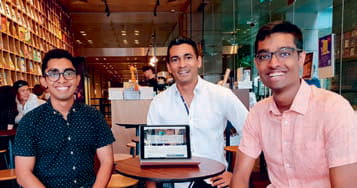
Better.sg co-founder Gaurav Keerthi (centre) has created an online platform for the sharing and distribution of crowdsourced face masks.
Singaporean Adrian Tan and his Vietnamese wife, Yen Vy Vu Tran, for instance, purchased and distributed 4,000 surgical masks outside Punggol MRT Station in northeast Singapore. Their generosity is mirrored in the actions of a group of local volunteers who set up a pop-up “Everything for Free” store for healthcare workers outside the National University Hospital. This was stocked with S$30,000 worth of wellness products and daily essentials, including vitamin C and medicated patches donated by supermarkets Giant and Cold Storage as well as Guardian pharmacy.
Others are turning to technology to help meet pressing needs. A case in point is civic tech collective Better.sg, a social outfit that has set up the MaskGoShare platform that allows people to crowdsource and arrange for deliveries of masks by sharing postal code details.
“We started building the tool once we noticed that people were overbuying emergency supplies and wondered if we could nudge them into sharing any excess with those around them,” said Better.sg co-founder Gaurav Keerthi, an India-born Singaporean civil servant, in an earlier interview with the local broadsheet The Straits Times.
The non-profit has also reached out to various social organisations to list their needs on the website for better synergies and collaboration.
RALLYING TO THE CAUSE
While concerns about the spread of the virus remains, it has not deterred do-gooders from their mission. Prior to the circuit breaker measures launched by the Singapore Government in early April to prevent further community spread of the illness, Project Love Lunch – a ground-up initiative that collects packed food items and distributes them to poor families around Singapore – continued to witness a large number of enquiries from potential volunteers. “If anything, this proved that no matter what, when the situation demands, Singaporeans come together and rally to the cause,” says founder Priscilla Ong, who herself suffers from physical mobility challenges.
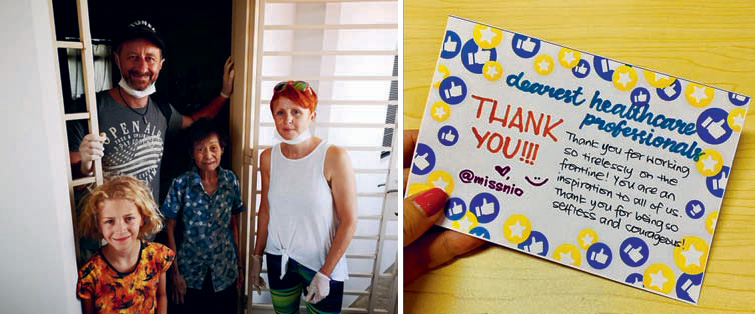
Czech volunteer Lana Longauerova and her family help to distribute packed food to the underprivileged through non-profit Project Love Lunch; appreciation notes for healthcare professionals.
One recent volunteer is Jana Longauerova, a Czech native who has lived in Singapore for the past two years. She roped in her entire family, including her IT consultant husband, Juraj Longauer, and three young children under the age of 10 to help with the distribution. “Back home in the Czech Republic, we used to donate financially. But when we moved here, I wanted my children to be involved in a more hands-on giving approach,” she shares. “It teaches them empathy and sensitivity to others by giving them an opportunity to meet people from different social backgrounds.”
Longauerova shares that working alongside Singaporeans, she is impressed with how well organised they are. “Priscilla has arranged for masks, gloves and sanitisers for all the volunteers,” she says.
“Our Singaporean teammates have been very friendly towards us, and our family hopes to continue doing this work long after the worst of the outbreak is over.”
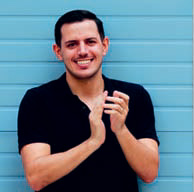
British expat Martin Verga launched the “Clap for Frontline Fighters” movement here to appreciate their relentless hard work in fighting the virus outbreak.
BOLSTERING THE FRONTLINE
Amid the public anxiety over the infectious disease – which, according to the World Health Organization (WHO), has an estimated 3.4 per cent* fatality rate globally – frontline healthcare workers have been risking their health and working overtime to care for infected patients.
Their hard work has sparked an outpouring of support from Singaporeans, including volunteers from StandUpForSg, a community group that canvassed the public to bring cheer to healthcare workers.
This has materialised in more than 800 messages featuring words of encouragement for doctors, nurses, ambulance drivers and cleaners, which the group has delivered to various hospitals, along with drinks and snacks. The group’s co-founder, Wally Tham, told local news outlet Today: “The work of frontline workers is invisible, and [if I were them] I would wonder if people know what I’m going through. I want them to know that there are thousands of people who care for and love them.”
By the same token, finance professional Martin Verga was inspired to launch a “Clap for Frontline Fighters” movement in Singapore – where he has lived for 10 years – after witnessing similar solidarity for the National Health Service back in his native Britain. “I thought it would be a great idea to bring it here because the community in Singapore has always been amazing to me, in terms of the spirit of coming together,” he said in an interview with The Straits Times.
“I Thought It Would Be A Great Idea To Bring The ‘clap For Frontline Fighters’ Movement Here Because The Community In Singapore Has Always Been Amazing, In Terms Of The Spirit Of Coming Together,” Says Briton Martin Verga.
And the gotong royong spirit has also proven to be outward facing. In the early stages of the disease, the Singapore Red Cross raised S$100,000 in public donations to help communities in China affected by Covid-19, while local integrated medical healthcare and aesthetic company Novena Global Lifecare pledged to donate up to one million masks and other medical supplies to hospitals in China. Singapore’s Temasek Foundation has also provided 40,000 Covid-19 test kits and two ventilators to the Philippines. Meanwhile, the Singapore Government donated S$730,000 to support the WHO’s Strategic Preparedness and Response Plan for Covid-19 to limit human-to-human transmission of the virus.
With the virus causing a global pandemic, cooperation across borders will be even more necessary than ever.
